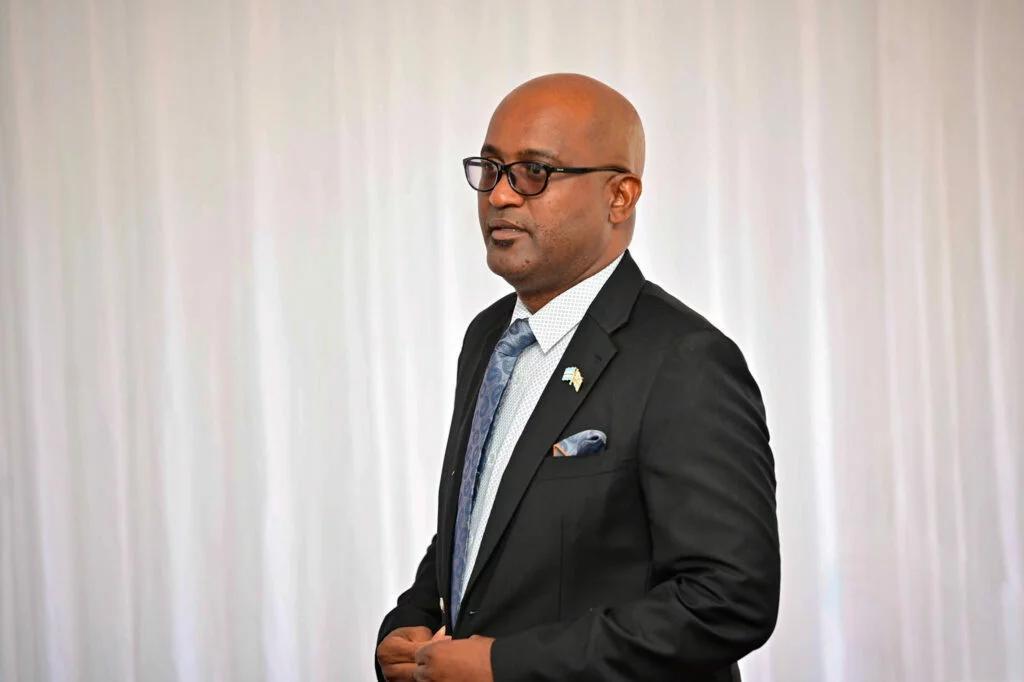Africa-Press – Botswana. The establishment of the Trans Kalahari Corridor (TKC), is a critical initiative that will not only transform the transportation ecosystem but remains a vital mechanism in pursuit of efficient, safe and integrated regional trade.
The Minister of Transport and Infrastructure, Mr Noah Salakae made this remarks during the recent launch of the 15th TKC Joint Law Enforcement Operation (TKC-JLEO) held at Ghanzi-Junction 44, under the theme: Seamless Borders, Seamless Trade: Securing the Trans Kalahari Corridor for Enhanced Economic Growth.
He said the operation was a demonstration of regional solidarity, a test of operational readiness and an opportunity to confront the persisting bottlenecks holding back economic potential.
The minister said Botswana, Namibia and South Africa share a deep historical, political and cultural ties that continued to strengthen their tripartite relationships.
Mr Salakae therefore, acknowledged that the operation would take the solidarity between the three countries to a greater height, as they now seek to open up the region not for trade only, but to also connect the nations through seamless borders and seamless development corridor.
He said the theme resonated well with their efforts as it directed the three countries to ensure that the processes and procedures that regulated the movement of people and goods along the TKC were simplified.
Mr Salakae urged the countries to take into consideration non-tariff barriers such as permit restrictions, inconsistent custom procedures, excessive driver working hours that he said silently limit both international and intra-regional trade.
He said commitment to eliminate such barriers were embedded in global and regional agreements they had endorsed such as the World Trade Facilitation Agreement, United Nations Conference on Trade and Development (UNCTAD) corridor guidelines, African Union Agenda 2063 and the Southern African Development Community protocol on trade.
As development initiative to promote seamless movement and trade, the minister said Botswana and Namibia launched a 24 hours operations at Mamuno and Trans Kalahari borders on Aril 2023.
He said similar initiative had been agreed to allow Tlokweng and Kopfontein borders to institute 24 hours operation too.
For his part, Minister of Works and Transport from Namibia, Mr Veikko Nekudi said through joint management of the corridor and harmonised policies and regulations they would eliminate bottle necks at the entry points.
Despite efforts made by the three countries to promote the corridor into an economic corridor, Mr Nekudi said they continued to observe that there were some inefficiencies in the transport logistics such as storage and trade facilitation, which he said if not attended to, they would continue to undermine Africa’s ability to feed its population effectively.
He therefore proposed for complementary services such as warehouses, food storage facilities and consolidation centres that he said would enhance food production, improve food security, eradicate poverty and create employment opportunities.
Giving the objectives, of the day, TKC Secretariat Executive, Mr Lesley Mpofu said the commitment of the three members had committed the AU to cultivate the spirit of eradicating poverty amongst their communities. South African Coordinator, Mr Segodi Mogotsi implored all parties to support the economic growth of the corridor by injecting resources that would lead to the expansion so as to continue bringing more opportunities and prosperity for all communities.
For More News And Analysis About Botswana Follow Africa-Press






